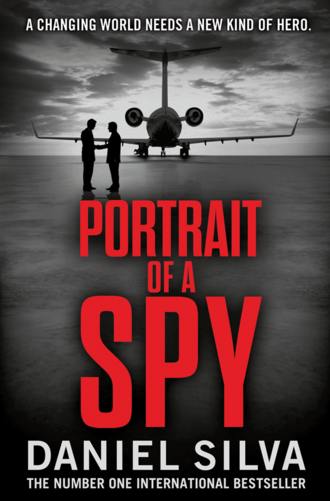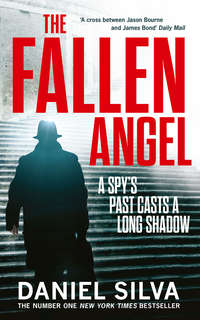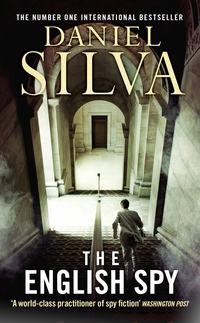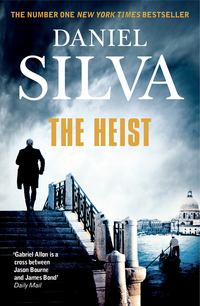
Полная версия
Portrait of a Spy
“So the solution is to send me, a former assassin with the blood of several Palestinian and Islamic terrorists on his hands?”
“When spies play nicely together, it tends to spill over into the political realm, which is why the prime minister is eager for you to make the trip as well.”
“The prime minister? The next thing you’re going to tell me is that Shamron is involved, too.”
“He is.” Navot picked up a stone and hurled it into the sea. “After the Iran op, I allowed myself to think Shamron might finally fade gracefully into the background. I was wrong. He has no intention of allowing me to run the Office without his constant interference. But that’s not surprising, is it, Gabriel? We both know Shamron had someone else in mind for the job. I’m fated to go down in the history of our illustrious service as the accidental chief. And you’ll always be the chosen one.”
“Choose someone else, Uzi. I’m retired. Remember? Send someone else to Washington.”
“Adrian won’t hear of it,” Navot said, rubbing his shoulder. “And neither will Shamron. As for your so-called retirement, it ended the moment you decided to follow Farid Khan into Covent Garden.”
Gabriel stared out at the sea and pictured the aftermath of the shot not taken: body parts and blood, Baghdad on the Thames. Navot seemed to sense what he was thinking. He pressed his advantage.
“The Americans would like you in Washington first thing in the morning. There’s a Gulfstream waiting for you outside London. It was one of the planes they used for the rendition program. They’ve assured me the handcuffs and hypodermic needles have been removed.”
“What about Chiara?”
“The invitation is for one.”
“She can’t stay here alone.”
“Graham has agreed to send a security team from London.”
“I don’t trust them, Uzi. Take her back to Israel with you. She can help Gilah look after the old man for a few days until I get back.”
“She might be there awhile.”
Gabriel looked at Navot carefully. He clearly knew more than he was saying. He usually did.
“I just agreed to restore a picture for Julian Isherwood.”
“A Madonna and Child with Mary Magdalene, formerly attributed to the Studio of Palma Vecchio, now tentatively attributed to Titian, pending peer review.”
“Very impressive, Uzi.”
“Bella’s been trying to broaden my horizons.”
“The painting can’t stay in an empty cottage by the sea.”
“Julian’s agreed to take it back. As you might expect, he’s rather disappointed.”
“I was supposed to be paid two hundred thousand pounds for that piece.”
“Don’t look at me, Gabriel. The cupboard is bare. I’ve been forced to institute across-the-board cuts in every department. The accountants are even after me to reduce my personal expenses. My per diem is a pittance.”
“Good thing you’re on a diet.”
Navot absently touched his midsection, as if checking to see whether it had expanded since leaving home.
“It’s a long drive back to London, Uzi. Maybe you should take along some of those scones.”
“Don’t even think about it.”
“You’re afraid Bella will find out?”
“I know she will.” Navot glared at the bodyguard leaning against the lifeboat ramp. “Those bastards tell her everything. It’s like living in a police state.”
Chapter 11
Georgetown, Washington, D.C.
THE HOUSE STOOD IN THE 3300 BLOCK OF N STREET, one of an elegant terrace of Federal-style residences priced far beyond the reach of all but the wealthiest of Washingtonians. Gabriel climbed the curved front steps in the gray half-light of dawn and, as instructed, entered without ringing the bell. Adrian Carter waited in the foyer, dressed in wrinkled chinos, a crewneck sweater, and a tan corduroy blazer. The attire, combined with his tousled thinning hair and unfashionable mustache, gave him the air of a professor from a minor university, the sort who championed noble causes and was a constant thorn in the side of his dean. As director of the CIA’s National Clandestine Service, Carter had no cause these days other than keeping the American homeland safe from another terrorist attack—though twice each month, schedule permitting, he could be found in the basement of his Episcopal church in suburban Reston preparing meals for the homeless. For Carter, the volunteer work was a meditation, a rare opportunity to thrust his hands into something other than the internecine warfare that raged constantly in the conference rooms of America’s sprawling intelligence community.
He greeted Gabriel with the circumspection that comes naturally to men of the clandestine world and ushered him inside. Gabriel paused for a moment in the center hallway and looked around. Secret protocols had been made and broken in these drably furnished rooms; men had been seduced into betraying their countries for suitcases filled with American money and promises of American protection. Carter had used the property so often it was known throughout Langley as his Georgetown pied-à-terre. One Agency wit had christened it the Dar-al-Harb, Arabic for the “House of War.” It was covert war, of course, for Carter knew no other way to fight.
Adrian Carter had not actively sought power. It had been foisted upon his narrow shoulders block by unwanted block. Recruited by the Agency while still an undergraduate, he had spent most of his career waging secret war against the Russians—first in Poland, where he funneled money and mimeograph machines to Solidarity; then in Moscow, where he served as station chief; and finally in Afghanistan, where he encouraged and armed the soldiers of Allah, even though he knew that one day they would rain fire and death upon him. If Afghanistan would prove to be the Evil Empire’s undoing, it would provide Carter with a ticket to career advancement. He monitored the collapse of the Soviet Union not from the field but from a comfortable office at Langley, where he had recently been promoted to chief of the European Division. While his subordinates openly cheered the demise of their enemy, Carter watched the events unfold with a sense of foreboding. His beloved Agency had failed to predict Communism’s collapse, a blunder that would haunt Langley for years. Worse still, in the blink of an eye, the CIA had lost its very reason for existence.
That changed on the morning of September 11, 2001. The war that would follow would be a war fought in the shadows, a place Adrian Carter knew well. While the Pentagon had struggled to come up with a military response to the horror of 9/11, it was Carter and his staff at the Counterterrorism Center who produced a bold plan to destroy al-Qaeda’s Afghan sanctuary with a CIA-funded guerrilla war guided by a small force of American special operatives. And when the commanders and foot soldiers of al-Qaeda began falling into American hands, it was Carter, from his desk at Langley, who often served as their judge and jury. The black sites, the extraordinary renditions, the enhanced interrogation methods—they all bore Carter’s fingerprints. He felt no remorse over his actions; he hadn’t that luxury. For Adrian Carter, every morning was September 12. Never again, he vowed, would he watch Americans hurling themselves from burning skyscrapers because they could no longer bear the heat of a terrorist fire.
For ten years, Carter had managed to keep that promise. No one had done more to protect the American homeland from the much-anticipated second attack, and for his many secret sins, he had been pilloried in the press and threatened with criminal prosecution. On the advice of Agency lawyers, he had retained the services of a high-priced Washington attorney, an extravagance that had steadily drained his savings and forced his wife, Margaret, to return to teaching. Friends had urged Carter to forsake the Agency and take a lucrative position in Washington’s flourishing private security industry, but he refused. His failure to prevent the attacks of 9/11 haunted him still. And the ghosts of the three thousand compelled him to keep fighting until his enemy was vanquished.
The war had taken its toll on Carter—not only on his family life, which was a shambles, but on his health as well. His face was gaunt and drawn, and Gabriel noticed a slight tremor in Carter’s right hand as he joylessly filled a plate with the government-issue treats arrayed atop the sideboard in the dining room. “High blood pressure,” Carter explained, as he drew coffee from a pump-action thermos. “It started on Inauguration Day, and it rises and falls in relation to the terrorist threat level. It’s sad to say, but after ten years of fighting Islamic terror, I seem to have become a living, breathing National Threat Advisory.”
“What level are we today?”
“Didn’t you hear?” asked Carter. “We’ve abandoned the old color-coded system.”
“What’s your blood pressure telling you?”
“Red,” said Carter dourly. “Bright red.”
“Not according to your director of homeland security. She says there’s no immediate threat.”
“She doesn’t always write her own lines.”
“Who does?”
“The White House,” said Carter. “And the president doesn’t like to needlessly alarm the American people. Besides, raising the threat level would conflict with the convenient narrative making its way around the Washington chattering classes these days.”
“Which narrative is that?”
“The one that says America overreacted to 9/11. The one that says al-Qaeda is no longer a threat to anyone, let alone the most powerful nation on the face of the earth. The one that says it’s time to declare victory in the global war on terror and turn our attention inward.” Carter frowned. “God, but I hate it when journalists use the word ‘narrative.’ There was a time when novelists wrote narrative and journalists were content to report facts. And the facts are quite simple. There exists in the world today an organized force that seeks to weaken or even destroy the West through acts of indiscriminate violence. This force is a part of a broader radical movement to impose sharia law and restore the Islamic Caliphate. And no amount of wishful thinking will make it go away.”
They sat on opposite sides of the rectangular table. Carter picked at the edge of a stale croissant, his thoughts clearly elsewhere. Gabriel knew better than to rush the proceedings. In conversation, Carter could be a bit of a wanderer. Eventually, he would make his way to the point, but there would be several detours and digressions along the way, all of which would undoubtedly prove useful to Gabriel at a later date.
“In some respects,” Carter continued, “I’m sympathetic to the president’s desire to turn the page of history. He views the global war on terrorism as a distraction from his larger goals. You might find this difficult to believe, but I’ve seen him on just two occasions. He calls me Andrew.”
“But at least he’s given us hope.”
“Hope is not an acceptable strategy when lives are at stake. Hope is what led to 9/11.”
“So who’s pulling the strings inside the administration?”
“James McKenna, assistant to the president for homeland security and counterterrorism, also known as the terrorism czar, which is interesting since he’s issued an edict banning the word ‘terrorism’ from all our public pronouncements. He even discourages its use behind closed doors. And heaven forbid if we happen to place the word ‘Islamic’ anywhere near it. As far as James McKenna is concerned, we aren’t engaged in a war against Islamic terrorists. We’re engaged in an international effort against a small band of transnational extremists. These extremists, who just happen to be Muslims, are an irritant, but pose no real threat to our existence or way of life.”
“Tell that to the families of those who died in Paris, Copenhagen, and London.”
“That’s an emotional response,” Carter said sardonically. “And James McKenna doesn’t tolerate emotion when it comes to talking about terrorism.”
“You mean extremism,” said Gabriel.
“Forgive me,” Carter said. “McKenna is a political animal who fancies himself an expert on intelligence. He worked on the staff of the Senate Select Intelligence Committee in the nineties and came to Langley shortly after the Greek arrived. He lasted only a few months, but that doesn’t stop him from describing himself as a veteran of the CIA. To hear McKenna tell it, he’s an Agency man who has the best interests of the Agency at heart. The truth is somewhat different. He loathes the Agency and all those who toil within its walls. Most of all, he despises me.”
“Why?”
“Apparently, I embarrassed him during a senior staff meeting. I don’t remember the incident, but it seems McKenna has never gotten over it. Beyond that, I’m told McKenna regards me as a monster who’s done irreparable harm to America’s image in the world. Nothing would make him happier than to see me behind bars.”
“It’s good to know the U.S. intelligence community is functioning smoothly again.”
“Actually, McKenna is under the impression it’s working just fine now that he’s running the entire show. He even managed to get himself appointed chairman of our new High-Value Detainee Interrogation Group. If a major terrorist figure is captured anywhere in the world, under any circumstances, James McKenna will be in charge of questioning him. It’s a great deal of power to place in the hands of a single person, even if that person were competent. But, unfortunately, James McKenna doesn’t fall into that category. He’s ambitious, he’s well intentioned, but he doesn’t know what he’s doing. And if he isn’t careful, he’s going to get us all killed.”
“Sounds charming,” said Gabriel. “When do I get to meet him?”
“Never.”
“So why am I here, Adrian?”
“You’re here because of Paris, Copenhagen, and London.”
“Who carried it out?”
“A new branch of al-Qaeda,” said Carter. “But I’m afraid they had support from a person who occupies a sensitive and powerful position in Western intelligence.”
“Who?”
Carter said nothing more. His right hand was shaking.
Chapter 12
Georgetown, Washington, D.C.
THEY ADJOURNED TO THE REAR terrace and settled into a pair of wrought-iron chairs along the balustrade. Carter balanced a coffee cup on his knee and gazed toward the gray spires rising gracefully above Georgetown University. Paradoxically, he was speaking of a shabby district of San Diego, where, on a summer day in 1999, there arrived a young Yemeni cleric named Rashid al-Husseini. With money provided by a Saudi-based Islamic charity, the Yemeni purchased a run-down commercial property, established a mosque, and went in search of a congregation. He did most of his hunting on the campus of San Diego State University, where he acquired a devoted following among Arab students who had come to America to escape the stifling social oppression of their homelands, only to find themselves lost and adrift in the ghurba, the land of strangers. Rashid was uniquely qualified to serve as their guide. The only son of a former Yemeni government minister, he had been born in America, spoke colloquial American English, and was the not-so-proud owner of an American passport.
“All sorts of strays and lost souls began stumbling into Rashid’s mosque, including a pair of Saudis named Khalid al-Mihdhar and Nawaf al-Hazmi.” Carter glanced at Gabriel and added, “I trust you’re familiar with the names.”
“They were two of the muscle hijackers from American Flight 77, personally selected by none other than Osama Bin Laden himself. In January 2000, they were present at the planning meeting in Kuala Lumpur, after which the Bin Laden Unit of the CIA managed to lose track of them. Later, it was discovered that both had flown to Los Angeles and were probably still in the United States—a fact you neglected to tell the FBI.”
“Much to my everlasting shame,” said Carter. “But this isn’t a story about al-Mihdhar and al-Hazmi.”
It was a story, Carter resumed, about Rashid al-Husseini, who soon developed a reputation in the Islamic world as a magnetic preacher, a man to whom Allah had granted a beautiful and seductive tongue. His sermons became required listening, not only in San Diego but also in the Middle East, where they were distributed by audiotape. In the spring of 2001, he was offered a clerical position at an influential Islamic center outside Washington, in suburban Falls Church, Virginia. Before long, Nawaf al-Hazmi was praying there, along with a young Saudi from Taif named Hani Hanjour.
“Coincidentally,” said Carter, “the mosque is located on Leesburg Pike. If you hang a left onto Columbia Pike and go a couple of miles, you run smack into the western façade of the Pentagon, which is exactly what Hani Hanjour did on the morning of 9/11. Rashid was in his office at the time. He actually heard the plane pass overhead a few seconds before impact.”
It did not take long for the FBI to connect al-Hazmi and Hanjour to the Falls Church mosque, said Carter, or for the news media to beat a path to Rashid’s door. What they discovered was an eloquent and enlightened young cleric, a man of moderation who condemned the attacks of 9/11 without equivocation and urged his Muslim brethren to forsake violence and terrorism in all its forms. The White House was so impressed with the charismatic imam that he was invited to join several other Muslim scholars and clerics for a private meeting with the president. The State Department thought Rashid might be the perfect sort of figure to help build a bridge between America and one and a half billion skeptical Muslims. The Agency, however, had another idea.
“We thought Rashid could help us to penetrate the camp of our new enemy,” said Carter. “But before we made our approach, we had to answer a few questions. Namely, was he somehow involved in the 9/11 plot, or were his contacts with the three hijackers purely coincidental? We looked at him from every conceivable angle, starting from the assumption that he had a great deal of American blood on his hands. We looked at timetables. We looked at who was where and when. And at the end of the process, we concluded that Imam Rashid al-Husseini was clean.”
“And then?”
“We dispatched an emissary to Falls Church to see whether Rashid might be willing to put his words into action. His response was positive. We picked him up the next day and took him to a secure location near the Pennsylvania border. And then the real fun began.”
“You started the assessment process all over again.”
Carter nodded. “But this time, we had the subject seated before us, strapped to a polygraph. We questioned him for three days, pulling apart his past and his associations, piece by piece.”
“And his story held up.”
“He passed with flying colors. So we placed our proposition on the table, accompanied by a great deal of money. It was a simple operation. Rashid would tour the Islamic world, preaching tolerance and moderation while at the same time supplying us with the names of other potential recruits to our cause. In addition, he was to be on the lookout for angry young men who appeared vulnerable to the siren song of the jihadis. We took him on a domestic test drive, working closely with the FBI. And then we went international.”
Operating from a base in a predominately Muslim neighborhood in East London, Rashid spent the next three years crisscrossing Europe and the Middle East. He spoke at conferences, preached in mosques, and sat for interviews with fawning journalists. He denounced Bin Laden as a murderer who had violated the laws of Allah and the teachings of the Prophet. He recognized the right of Israel to exist and called for a negotiated peace with the Palestinians. He condemned Saddam Hussein as thoroughly un-Islamic, though, on the advice of his CIA handlers, he stopped short of endorsing the American invasion. His message did not always go over well with his audiences, nor were his activities confined to the physical world. With CIA assistance, Rashid built a presence on the Internet, where he attempted to compete with the jihadist propaganda of al-Qaeda. Visitors to the site were identified and tracked as they moved through cyberspace.
“The operation was regarded as one of our most successful efforts to penetrate a world that, for the most part, we had found almost entirely opaque. Rashid fed his handlers a steady stream of names, good guys and potential bad guys, and even tipped them off about some plots that were brewing. At Langley, we spent a great deal of time marveling at our cleverness. We thought it would go on forever. But it all ended rather suddenly.”
The setting, fittingly enough, was Mecca. Rashid had been invited to speak at the university, a high honor for a cleric who had been cursed with an American passport. Given the fact that Mecca is closed to infidels, the CIA had no choice but to allow him to go alone. He flew from Amman to Riyadh, where he met a final time with one of his CIA handlers, then boarded an internal Saudia Airlines flight to Mecca. His speech was scheduled for eight that evening. Rashid never showed up. He had vanished without a trace.
“At first, we feared he’d been kidnapped and killed by a local branch of al-Qaeda. Unfortunately, that turned out not to be the case. Our prized possession resurfaced on the Internet a few weeks later. The eloquent, enlightened young man of moderation was gone. He’d been replaced by a raving fanatic who preached that the only way to deal with the West was to destroy it.”
“He deceived you.”
“Obviously.”
“For how long?”
“That remains an open question,” said Carter. “There are some at Langley who believe Rashid was bad from the beginning, others who theorize he was driven over the edge by the guilt of working as a spy for the infidels. Whatever the case, one thing is beyond dispute. During the time he was traveling the Islamic world on my dime, he recruited an impressive network of operatives, right under our noses. He’s the ultimate talent spotter and skilled in the art of deception and misdirection. We hoped he would stick to preaching and recruiting, but that hope turned out to be misplaced. The attacks in Europe were Rashid’s coming-out party. He wants to replace Osama Bin Laden as leader of the global jihadist movement. He also wants to do something Bin Laden was never able to accomplish after 9/11.”
“Strike the Far Enemy in his homeland,” said Gabriel. “Shed American blood on American soil.”
“With a network bought and paid for by the Central Intelligence Agency,” Carter added soberly. “How would you like that chiseled on your headstone? If it were ever made public that Rashid al-Husseini was once on our payroll . . .” Carter’s voice trailed off. “Ashes, ashes, we all fall down.”
“What do you want from me, Adrian?”
“I want you to make the bombing in Covent Garden the last attack Rashid al-Husseini ever carries out. I want you to smash his network before anyone else dies because of my folly.”
“Is that all?”
“No,” said Carter. “I want you to keep the entire operation secret from the president, James McKenna, and the rest of the American intelligence community.”
Chapter 13
Georgetown, Washington, D.C.
ADRIAN CARTER WAS DOCTRINAIRE WHEN it came to matters of tradecraft, which meant he could not talk for too long within the confines of a safe house, even if it was one of his own. They descended the curved front steps and, with a single CIA security man in tow, headed westward along N Street. It was a few minutes after nine o’clock. Carter’s penny loafers tapped rhythmically on the redbrick sidewalk, but Gabriel seemed to move without a sound. A Metro bus rumbled past, filled to capacity. Gabriel pictured the same bus torn in half and engulfed in flames.
“Where did he go after leaving Mecca?”
“We believe he’s living under the protection of tribal elements in the Rafadh Valley of Yemen. It’s a completely lawless place, without schools, paved roads, or even a reliable supply of water. In fact, the entire country is dry as a bone. Sana might be the first capital city on Earth to actually run out of water.”
“But not Islamic militants,” said Gabriel.







